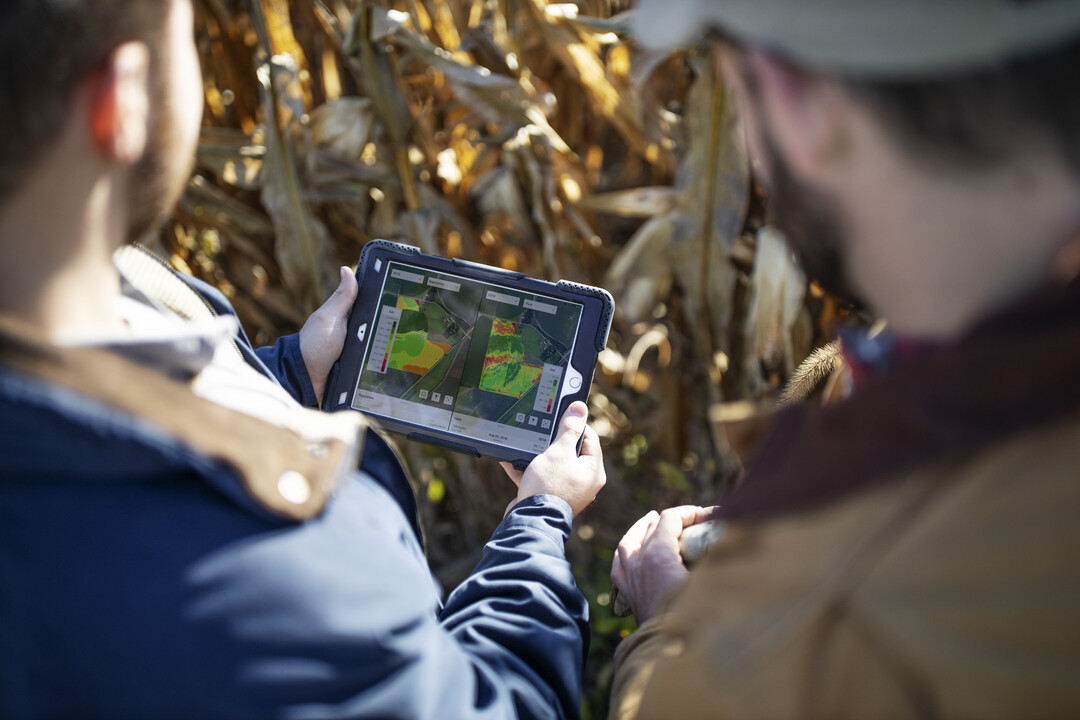Harvesting Data: A New, Digital Approach Mitigating Agricultural Risk
by Bob Reiter, Head of Research & Development, Crop Science at Bayer
Published 09-29-21
Submitted by Bayer

Originally published on LinkedIn
Throughout my career in agriculture, I've been inspired by how eagerly growers have embraced progress. Today's farmer is tech-savvy and open to digital tools – ranging from apps and GPS to AI and machine learning – that can fuel smarter and more productive decisions.
The data revolution likewise marks a pivot point for Bayer. As agriculture and the growers we serve evolve, we also must shift from an organization that simply provides seeds and crop protection products to one that offers the science and guidance to optimize performance and build a more effective and resilient food chain.
As the use of data gathering and analytics expands, it's important to ensure this information is both digestible and actionable. Data is meaningful only if it delivers value for growers, and in turn the consumers and partners they serve. With so many new sources of incoming data, and increasing volumes to review and process, how can we as an industry focus on what's most essential for a successful harvest?
I recently discussed some of the ways Bayer already is translating data into impactful innovation as part of an event with Fast Company. Alongside Kyle Bridgeforth, co-owner of Bridgeforth Farms, and Dr. Karen Hildebrand of Amazon Web Service, we shared how real-time data is guiding our industries. It certainly gave us plenty to think about as we look ahead to the rest of 2021 and beyond (and I encourage everyone to check out the full discussion).
Here are just two examples that demonstrate how the data revolution already is reshaping our approach.
Providing New Opportunities for Growers
Data quite literally is transforming farming operations. Predictive analytics combined with historical and real-time data provide growers with the essential insights they need to navigate the season, ranging from what and where to plant to the most efficient and sustainable treatment methods. Growers in turn can unlock the potential of every square meter of field while becoming better stewards of their land.
For Bayer, this means providing more resources and opportunities for growers to understand field and market dynamics, and shift their mindsets from the idea that "only local data has value" to "data from everywhere can unlock powerful insights." With our Climate FieldView app, growers receive a single, convenient source to collect, store, and visualize critical field data and forecast the potential impact of their decisions. We also recently launched our Orbia online product trading platform in Latin America to provide insights on market conditions while also serving as a digital loyalty program where users can accumulate and trade credits for seeds, crop protection products and fertilizers from 120 accredited distributors.
Data and digital farming additionally are helping us provide new value to growers through unique business models and initiatives such as our Carbon Program, which rewards farmers for adopting climate-smart practices including no-till farming and the use of cover crops.
Providing Growers with Better Tools
While our role as a leading agriculture organization is to help growers gather, evaluate and act upon field data, this collaboration also offers greater understanding of their greatest needs – and how to turn this expanded visibility into new products like seed varieties, crop protection solutions or digital tools.
For instance, we're already embarking on data-driven development and production programs within our seed breeding and research facilities – such as our Marana Greenhouse – to help crops better adapt to various global environments. Data also is the basis of our disease resistance modeling program, which not only provides growers with tools to identify and counter harmful diseases earlier, but also empowers our research team to pursue crop varieties already safeguarded against given conditions.
We're likewise continuing to expand our integrated weed management program to offer growers a variety of tools to eradicate harmful weeds, sustain weed control systems over time and maintain their potential to provide a productive harvest while protecting the soil and environment. For example, our FieldCatcher app, provided by Bayer’s Crop Protection Innovation Lab, enables farmers to identify weeds, pests and diseases simply by taking a photo with their smartphone. Powered by machine learning and artificial intelligence, FieldCatcher helps farmers identify risks quickly and precisely.
Data and digital technology offer so many exciting possibilities to reimagine agriculture. Beyond just having access to data, it's critical to make these technologies easier and more beneficial for growers to adopt…and deliver new solutions that provide added resiliency for our entire food system against known and unknown risks.
Have you or your organization embarked on any unique data-driven programs? Where are you or your customers struggling most to collect and act upon data? Leave a comment here to continue the conversation. I would love to hear about your experiences.

Bayer
Bayer
Bayer: Science For A Better Life
Bayer is a global enterprise with core competencies in the Life Science fields of health care and agriculture. Its products and services are designed to benefit people and improve their quality of life. At the same time, the Group aims to create value through innovation, growth and high earning power. Bayer is committed to the principles of sustainable development and to its social and ethical responsibilities as a corporate citizen. In fiscal 2015, the Group employed around 117,000 people and had sales of EUR 46.3 billion. Capital expenditures amounted to EUR 2.6 billion, R&D expenses to EUR 4.3billion. These figures include those for the high-tech polymers business, which was floated on the stock market as an independent company named Covestro on October 6, 2015. For more information, go to www.bayer.com.
More from Bayer

